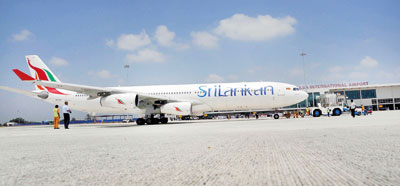Sunday Times 2
Running an airline: Degree by degree
View(s):I have noticed a lot of publicity these past few months about SriLankan Airlines. A recent news item reported that we will have to pay no less than 170 million US dollars to cancel a previously ill-conceived order for four new A350 Airbus planes – while we also heard that the Airline Pilots Guild threatened to strike after the board decided in a “cost cutting exercise” to deny pilots the long-established facility of using the business class lounge.
SriLankan Airlines is in big trouble. When the strategic partnership between Sri Lankan and Emirates ended in 2008, the accumulated profit in that financial year was Rs: 9.288 billion. For the seven years 2008 to 2015, the total loss was no less than Rs.128.238 billion!
 Last month, SriLankan’s Chairman reported that during financial year 2015-16, the airline’s group loss was Rs.11.59 billion (which included payment for cancelling the lease of one A350 aircraft).
Last month, SriLankan’s Chairman reported that during financial year 2015-16, the airline’s group loss was Rs.11.59 billion (which included payment for cancelling the lease of one A350 aircraft).
Horrified by these losses, I started musing – is this all due to mismanagement? How do other countries which have profitable airlines select competent people to run their airlines?
During the year 2015, I discovered that the airlines earning the largest profits were American Airlines, United Airlines, Delta Airlines and Southwest Airlines in the US – and internationally airlines like Emirates, Japan Airlines and Lufthansa.
One of the most successful airlines in the Asian region, Singapore Airlines, reported a net profit of $804 million in the 2015-16 financial year – almost double what it earned in 2014-15.
So I decided to study the boards running these airlines, in particular the people tasked with chairing their boards of directors.
Singapore Airlines, I found, has as its Chairman Stephen Lee Ching Yen, who holds a Master of Business Administration from Northwestern University in Illinois. He has an extensive background in business, being a member of the boards of various banks, investment companies and one of Singapore’s most successful enterprises, Fraser and Neave. He has also been president of the Singapore National Employers’ Federation.

Are SriLankan's losses due to mismanagement?
The chairman of Emirates Airlines and Groups is Sheikh Ahmed bin Saeed Al Maktoum, celebrated as “the man who put Dubai on the global aviation map”. Having graduated from the University of Denver in Colorado he was in 1985 appointed president of the Dubai department of civil aviation and chairman of the newly launched airline Emirates. It would certainly have helped that his father, and subsequently his older brother, were both rulers of Dubai – and that the current Emir of Dubai, Sheikh Mohammed bin Rashid al Maktoum, is his nephew – but Sheik Ahmed has, by shrewdly utilising his education, connections and business acumen, been at the forefront of Dubai’s amazing economic success story and in particular the successful expansion of its aviation.
The chairman of Japan Airlines, Masaru Onishi graduated from Tokyo University with a Bachelor’s degree in engineering and joined Japan Airlines in 1978. With over 30 years of experience working for the airline, he was appointed to the board in 2012 and made chairman in 2014.
Mr. Carsten Spohr, Chairman of Lufthansa, not only has a degree in industrial engineering from Karlsruhe University, he is also a qualified Airbus pilot and has completed a management training programme at Deutsche Aerospace. He has been with the airline in various roles since 1994. As for Douglas ‘Doug’ Parker, chairman of the board of American Airlines, the world’s most profitable airline over the past few years – he did a BA in economics and then an MBA from Vanderbilt University in 1986 – and has been working for the airline ever since.
So all these men who run the world’s profit-making airlines are university educated, experienced people, who have acquired extensive business experience working for many years either for the airline itself or large public enterprises.
I spent a lot of time researching all this because I wanted to compare it with the way our successive governments have appointed people to run our national airline. During most of Mahinda Rajapaksa’s time in office, the chairman of the board of SriLankan airlines was his wife’s brother Nishantha Wickramasinghe, a one time tea planter who left school in 1967 after acquiring his only academic qualification, the GCE O Level. When Ranil Wickremesinghe came into power, he appointed his friend and classmate, Ajith Dias, who also had nothing more academically than his O Levels and was a businessman involved in garment manufacture and coffee retailing.
Neither of these chairmen had any experience of the aviation industry when they were appointed .
A national airline should not be an asset for a country’s rulers to provide perks for their friends and relations. Wrong decisions and errors of management made by folk who have neither the requisite education nor aviation experience to oversee an airline have to be paid for by our taxes.
Airlines like Lufthansa, American Airlines, Japan Airlines, Singapore Airlines and Emirates have demonstrated to the world the best way to run an airline – select educated individuals who have experience in the aviation industry and give them the required resources to earn wealth for the country.
Sadly, what successive political leaders in our country have amply demonstrated is not how to run but how to ruin our national airline.

